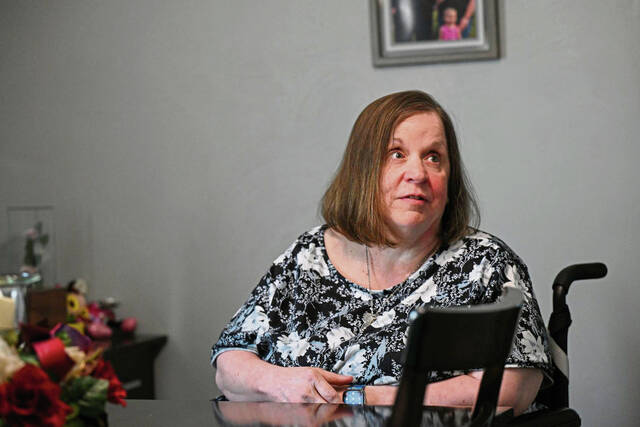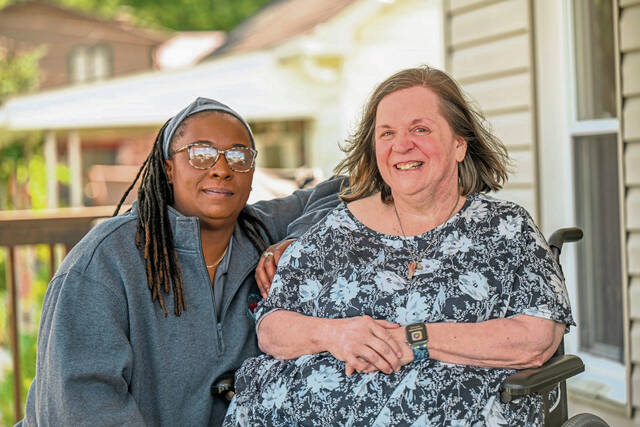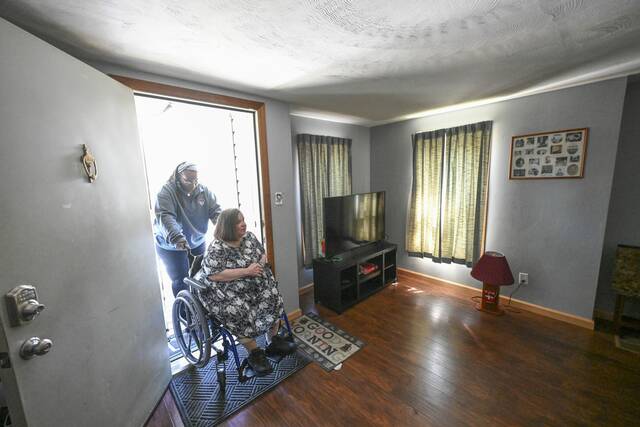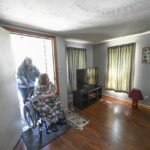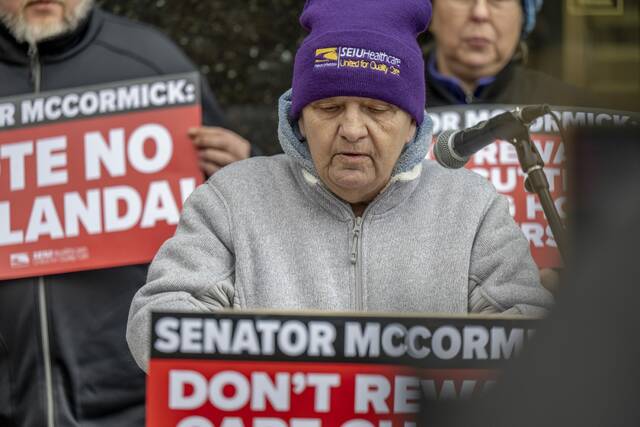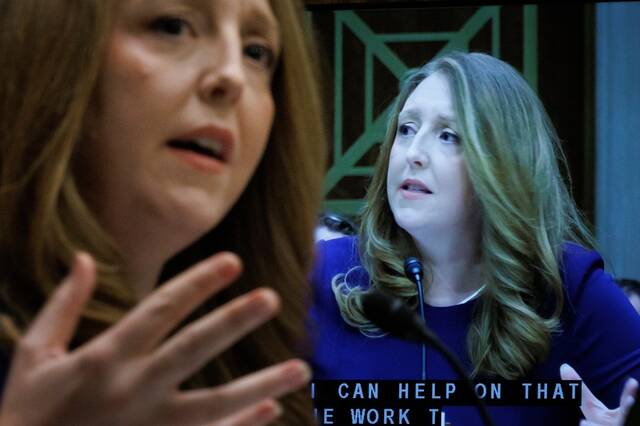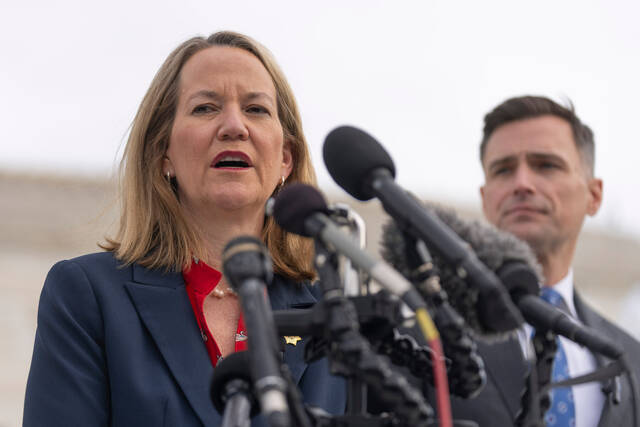Lisa Sprague does what she can on her own, but nerve damage caused by multiple sclerosis means she needs help getting out of bed, bathing and completing other daily tasks.
The state pays for 13 hours of care every day at her Harmar home, a bungalow retrofitted with a wheelchair lift up to her front deck.
The program is a huge financial relief. But in Sprague’s telling, the people sent to assist her aren’t always up to the job.
One arrived reeking of marijuana, she said. Another brought her pet rabbit and left Sprague alone while she played with it in the yard. A third asked for $30 in gas money, according to Sprague. It felt like a threat, she said, so she paid him through Cash App.
But her greatest worry is the home care agency that employs her caregivers won’t have any staff available at all, leaving her stuck in bed until her adult son, Charlie, returns from work.
“You wake up and you’re thinking, ‘Is somebody going to show up today?’ ” said Sprague, 59.
About 112,000 personal-care shifts go unfilled every month, according to the Pennsylvania Homecare Association.
The trade group blames the staffing crisis on measly state payments for home care, and it’s pressing lawmakers in Harrisburg to prioritize the industry in budget talks, which are at an impasse.
The amount of new money under consideration by legislators to aid the industry is a fraction of what the association says is needed. None of it would go toward the agencies supplying a huge majority of caregivers.
Each missed shift, an older adult or someone with disabilities who uses these services in Pennsylvania might go without care ranging from simple companionship to the extensive help Sprague receives.
This assistance is distinct from skilled nursing, hospice or at-home therapy services, and encompasses a big chunk of the 400,000-plus Pennsylvanians who get home care each year. It helps people avoid facilities like nursing homes and can come at half the cost, according to survey data from long-term-care insurer Genworth.
Still, fixing the system wouldn’t be cheap.
Pennsylvania reimburses agencies an average of $20.63 an hour for personal care. It would take an additional $800 million to raise that rate above $25 an hour — allowing agencies to pay their workers more — and close the labor shortfall, according to a study released in February by the Pennsylvania Department of Human Services.
Agencies say they’re stretching current payments as far as they can, streamlining operations and reducing administrative overhead, but it’s hardly enough to offer competitive wages.
“Agencies like ours want nothing more than to pay caregivers more,” a group of Pittsburgh-area care agencies said in a recent letter to state Senate Majority Leader Joe Pittman, R-Indiana, and state Senate President Pro Tempore Kim Ward, R-Hempfield.
The starting hourly wage is between $12 and $14 at most agencies in Southwestern Pennsylvania, making it difficult to recruit and retain qualified employees, according to Ben Kondor, Pennsylvania division director at BAYADA Home Health Care.
“In today’s landscape, you have the Sheetz of the world, the Amazon, the big box store — you name it — paying $15 an hour,” Kondor said. “We’re losing the workforce to competition outside of our industry just based upon wage disparities that are caused by those reimbursements.”
Those willing to stay in the home care industry are better served crossing state lines.
In West Virginia, the average hourly reimbursement to agencies is $25.44. Maryland offers a touch more, at $25.58. Ohio puts up $28.96, 40% more than Pennsylvania.
“I just want the lawmakers to care and listen and do something about this,” Sprague said.
Budget talks
More money could be in the pipeline for home care, just not for agencies.
Gov. Josh Shapiro’s proposed budget for the 2025-26 fiscal year includes an additional $21 million to pay workers hired directly by patients, which would bring that particular rate to $15 or more an hour from an average of $13.51. The Democrat-controlled House followed suit in its draft budget.
“It will help us tremendously,” said Angela Ingram, 56, of the Hill District, who has been a patient-hired caregiver for several years. “There’s times I have to use food banks to eat.”
Ingram is among 8,500 workers — most of them represented by the Service Employees International Union — who would get a raise.
Participant-directed care is better for workers, the union argues, because the entire reimbursement goes into caregivers’ pockets. It may also benefit recipients by giving them greater control of the hiring, training and supervision of their aides.
“It’s a relatively small but very smart investment,” said Silas Russell, executive vice president and director of policy and research for Service Employees International Union Healthcare Pennsylvania.
The remaining 140,000 or so caregivers who work through agencies would not see any extra money. The governor’s office said it’s prioritizing directly hired care workers because agencies got more financial help dealing with covid-19.
“We are open to a discussion with the General Assembly to propose additional funding for workers in either model or any other (long-term care) program,” Shapiro’s office added.
The Pennsylvania Homecare Association is asking for a $370 million increase in the reimbursement rates across both care models in the upcoming budget, which would bring hourly payments to agencies to just under $23 an hour. That would represent a 10% increase to reimbursements for agencies, the association said.
Neither the House nor the Senate’s draft budgets honor that request as negotiations drag on for a spending bill almost three months overdue.
“I do not envy what either chamber or any of the caucuses face in this year’s budget,” said Cody Jones, senior director of government affairs for the Pennsylvania Homecare Association. “That being said, we’re not looking at a potential crisis. We are in a workforce crisis right now.”
Beth Rementer, a spokeswoman for state House Majority Leader Matt Bradford, D-Montgomery County, said House Democrats are in ongoing discussions with the Pennsylvania Homecare Association and “recognize that this is a critical issue for both the workforce and care of our older residents.”
Kate Flessner, a spokeswoman for Pittman, referred TribLive to the senator’s Sept. 10 budget update, which made no mention of home-care reimbursements.
Securing care
Pennsylvania residents who receive home care each year get it through a variety of programs.
Most programs are funded through some amount of federal Medicaid dollars. Act 150, created by Pennsylvania in the 1980s, is entirely state funded and is meant to cover people who are just over the Medicaid income threshold. For an individual, that’s about $2,900 a month.
Regardless of the program, the state reimburses agencies for personal assistance services from the same pot of money.
The $20.63 figure is an average — the state splits reimbursement rates into four regions based on the cost of doing business. The region encompassing Allegheny, Armstrong, Beaver, Fayette, Greene, Washington and Westmoreland counties has the lowest of the four at $19.32.
For the most part, children younger than 21 are covered by a separate set of programs with different payment rates.
When using agencies, care recipients like Sprague are free to choose between providers that have enrolled in their program and are willing to take on new cases, according to the state Department of Human Services.
Sprague got a new provider about a year ago: Caring Personal Touch, a West Mifflin-based agency run by industry veteran Renee Carter. Sprague said she now receives more consistent and compassionate care from Carter and her employees.
The two have become close friends.
“We just cut up most of the time,” Carter said, standing in Sprague’s dining room on a late August morning. Carter’s phone is constantly ringing, but on days when she’s stretched particularly thin, the room transforms into her office.
Carter has changed Sprague’s life. But “not everyone has a Renee,” Sprague noted.
‘That same spiral’
As of about a month ago, Carter employed 17 caregivers. Only four had been with her agency for more than a year. The Pennsylvania Homecare Association places the industry’s annual quit rate at nearly 80%.
New hires have to complete a background check and tuberculosis test. They must also possess a nursing license, nurse aide certification or passing grade from one of several training programs.
After all that, a lot of Carter’s new hires hang it up just a few weeks in, complaining their cases are too challenging or far away. She has to start the recruiting process from scratch.
“It’s just that same spiral over and over again,” she said.
BAYADA, a larger agency, has the same struggles. It maintains a workforce of around 100 caregivers, about a quarter of whom were hired within the past three months.
“The 90-day mark is a huge number for us,” Kondor said. “If someone successfully makes it to 90 days, that individual, they’ve probably found a client they enjoy.”
Consistency matters, and not just for the agencies.
About five years after her multiple sclerosis diagnosis and just over one year after her husband, Charles, died, Sprague said she’s just looking for “a little bit of normal” in her life.
Each time she switches caregivers, that stability is disrupted.
“I make friends with them, I trust them, and then they find other jobs because this is not a livable wage to make,” Sprague said.


